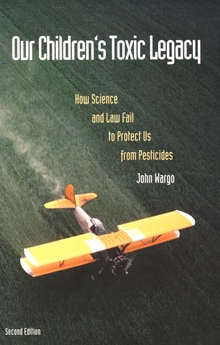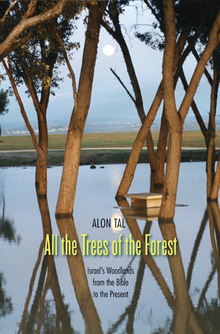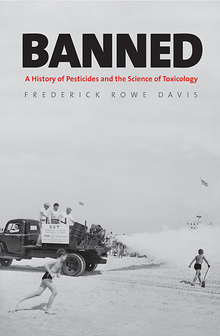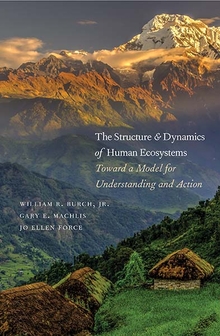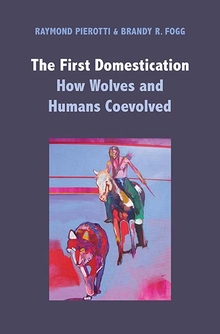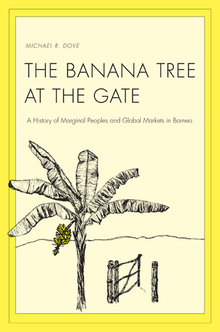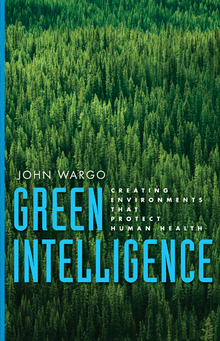Our Children's Toxic Legacy
WARNING
You are viewing an older version of the Yalebooks website. Please visit out new website with more updated information and a better user experience: https://www.yalebooks.com
How Science and Law Fail to Protect Us from Pesticides
John Wargo
By 1969, nearly 60,000 separate pesticide products were registered for use by the U.S. government, each with the expectation that pesticides could be used safely, that they quickly broke down into harmless substances, or that dangerous levels of exposure could be accurately predicted and somehow avoided. Faith in these assumptions was gradually eroded as experts grew to understand the persistence, movement, and toxicity of the chemicals involved. Nevertheless, government continues to hold the discretion to balance risks against economic benefits in its licensing decisions. The underlying legal strategy, Wargo claims, has been one that places extraordinary faith in government's ability to somehow ensure that only safe levels of contamination and exposure occur. And the effect has been systematic neglect of those exposures and risks faced by children.
Wargo presents a compelling case that children are more heavily exposed to some pesticides than adults and are especially vulnerable to some adverse effects. How should the fractured body of environmental law be repaired to manage the distribution of risk? This is the central question Wargo addresses as he suggests fundamental reforms of science and law necessary to understand and contain the health risks faced by children.
John Wargo, associate professor in the School of Forestry and Environmental Studies and the department of political science at Yale University, has testified in Congress and been an adviser to federal policymakers on environmental issues.
"Those who think current law protects children from pesticides must read this book. Wargo is a leading expert on environmental law and health risks for children. He demonstrates that children are more susceptible than adults to the toxic effects of pesticides, and are exposed more often because the law ignores these special vulnerabilities of children. Wargo's compelling analysis explains how these dangers developed and what we can do to protect current and future generations."—Senator Edward M. Kennedy
"This book provides scientists, lawmakers and regulators with a blueprint for change in the way we go about protecting children from dangerous chemicals. And it sends a clear warning signal to the general public about the threats that remain in our environment. In the tradition of Silent Spring, John Wargo has given us a book that will change the way readers view the world around them, and the way government responds to the environmental challenges of our time."—Senator Joseph I. Lieberman
"John Wargo gives us not only the most comprehensive survey of pesticide regulation currently available in print but a probing, disturbing analysis of our longstanding failure to recognize that toxic exposures affect some people much more severely than others. We owe it to our children to pay attention to this important book."—William Cronon
"In a book long overdue, Wargo traces the development of the pesticide industry, beginning with the discovery in 1939 of the powerful insecticide DDT. . . . Ultimately, this carefully researched work shows how incomplete scientific evidence, a fractured legal system, and a bureaucratic federal agency (the EPA) have resulted in failure to set objective, enforceable standards and solve this pressing global problem."—Choice
"Wargo's book is just as much a guide to future controversy as it is a document of controversies now supposedly ended."—Robert Hunt Sprinkle, Journal of the American Medical Association
"Our Children's Toxic Legacy is a profound, disturbing and well-researched book. Most . . . will come away . . . hoping . . . that Wargo's prescription for reform is seriously considered by policymakers."—Mark Dowie, Los Angeles Times
"A devastating case that the very nature of science and law has prevented regulation from reducing pesticide risks to socially acceptable levels."—Edward Groth III, Nation
"An exceptionally important book, with forceful arguments based on carefully compiled evidence. Wargo is unfailingly informative and thoughtful."—Daniel J. Kevles, New York Review of Books
"The book is a very useful reference on pesticides and their regulation in America with some international examples. . . . This book should appeal to medical researchers interested in American policy and the potential toxicity of pesticides innocuously consumed in our environment."—D. Nathan, Public Health
"Wargo provides a comprehensive assessment of pesticide regulation, demonstrates that children are substantially more susceptible than adults to the toxic effects of pesticides, and describes the current threat from pesticides around the globe."—Reference & Research Book News
"Wargo makes a devastating case that the very nature of science and law has prevented regulation from reducing pesticide risks to socially acceptable levels."—Edward Groth III, Science
"Wargo provides a comprehensive blueprint for managing the environment of children through legal reform and early assessment of risk."—Science News
"In its in-depth analysis of the systematic flaws undermining our pesticide regulatory system, Our Children's Toxic Legacy is rigorous, extensively argued, well-documented, and even-handed, examining divergent perspectives with care. . . . A must read for the concerned consumer."—Wendy Gordon, The Green Guide
"[Wargo's] book is rigorous, extensively argued and documented, and examines divergent perspectives with great care. . . . By soberly and methodically drawing our attention once again to this alarming issue, Wargo has produced a 'Silent Spring' for the 90's."—Steve Heilig, The San Francisco Chronicle
"In this book John Wargo persuasively argues that a full-scale overhaul of the regulation and management of pesticides and other toxic chemicals in the United States is badly needed. . . . An excellent primer on the history of pesticide use in the United States. . . . An excellent resource for those interested in the chemical industry, the environment or trends in human health."—Gary Lee, Washington Post Book World
"A detailed, comprehensive, and referenced history of how science and laws have failed to protect us from the hazards of pesticides. . . . Highly recommended to all concerned with pesticides: public health officials, government officials responsible for regulation reform, the medical community, parents, and the general public. The book is thoroughly researched and documented, written in a straightforward reasoned manner. The author, John Wargo, is eminently qualified to have written this book."—Beatrice Trum Hunter, Townsend Letter for Doctors & Patients
"Anyone seriously committed to reducing the use of pesticides and protecting public health and the environment from these chemicals should read this book."—Lawrie Mott, Environment
"John Wargo has written a gem of a book, one that is as inform Our Children's Toxic Legacy stands as an example of what a thoroughly researched book can offer. . . . This is an excellent book, one that is impressive for both its scholarly presentation and its vitally important agenda. Though it lacks the passion of Rachel Carson's Silent Spring, one can certainly argue that is deserves similar popularity."—Peter J. Stoett, Perspectives on Political Science
"Those searching for an authoritative discussion of the hazards of pesticides and the failings of American law need look no further than this book."—Christopher J. Bailey, Environmental Politics
"The book is a good read for the environmental activist, the armchair ecologist and the child advocate. . . . It should be required reading for all environmental and public health policy makers and any elected official concerned with large-scale issues that will persist beyond the next election."—Dona Schneider, The Environmentalist
"Anyone seeking to understand the strengths and weaknesses of current U.S. laws and regulations aimed at limiting exposure to pesticides will find this book informative, balanced, and authoritative. As an example of how laws and regulations can affect the development of science and, to a much lesser extent, technology, this volume serves as an illustrative case study without the author's attempting to support a specific theoretical model of scientific or technological change."—Hugh Gorman, Technology and Culture
"This book will make an important contribution to the pesticide policy debate currently raging in Washington. It must be read by every informed participant in this debate."—Philip J. Landrigan, M.D., Mount Sinai School of Medicine, New York
Publication Date: April 20, 1998
32 b/w illus.

